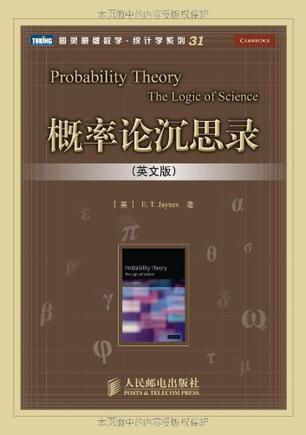内容简介
《概率论沉思录(英文版)》将概率和统计推断融合在一起,用新的观点生动地描述了概率论在物理学、数学、经济学、化学和生物学等领域中的广泛应用,尤其是它阐述了贝叶斯理论的丰富应用,弥补了其他概率和统计教材的不足。全书分为两大部分。第一部分包括10章内容,讲解抽样理论、假设检验、参数估计等概率论的原理及其初等应用;第二部分包括12章内容,讲解概率论的高级应用,如在物理测量、通信理论中的应用。《概率论沉思录(英文版)》还附有大量习题,内容全面,体例完整。
《概率论沉思录(英文版)》内容不局限于某一特定领域,适合涉及数据分析的各领域工作者阅读,也可作为高年级本科生和研究生相关课程的教材。
......(更多)
作者简介
......(更多)
目录
PartⅠ Principlesandelementaryapplications
1 Plausiblereasoning
1.1 Deductiveandplausiblereasoning
1.2 Analogieswith slcaltheories
1.3 Thethinkingcomputer
1.4 Introducingtherobot
1.5 Booleanalgebra
1.6 Adequatesetsofoperations
1.7 Thebasicdesiderata
1.8 Comments
1.8.1 Commonlanguagevs.formallogic
1.8.2 Nitpicking
2 Thequantitativerules
2.1 Theproductrule
2.2 Thesumrule
2.3 Qualitativeproperties
2.4 Numericalvalues
2.5 Notationandfinite-setspolicy
2.6 Comments
2.6.1 Suectlvevs.oectlve
2.6.2 G/3delstheorem
2.6.3 Venndiagrams
2.6.4 TheKolmogorovaxioms
3 Elementarysamplingtheory
3.1 Samplingwithoutreplacement
3.2 Logicvs.propensity
3.3 Reasoningfromlesspreciseinformation
3.4 Expectations
3.5 Otherformsandextensions
3.6 Probabilityasamathematicaltool
3.7 Thebinomialdistribution
3.8 Samplingwithreplacement
3.8.1 Digression:asermononrealityvs.models
3.9 Correctionforcorrelations
3.10 Simplification
3.11 Comments
3.11.1 Alookahead
4 Elementaryhypothesistesting
4.1 Priorprobabilities
4.2 Testingbinaryhypotheseswithbinarydata
4.3 Nonextensibilitybeyondthebinarycase
4.4 Multiplehypothesistesting
4.4.1 Digressiononanotherderivation
4.5 Continuousprobabilitydistributionfunctions
4.6 Testinganinfinitenumberofhypotheses
4.6.1 Historicaldigression
4.7 Simpleandcompound(orcomposite)hypotheses
4.8 Comments
4.8.1 Etymology
4.8.2 Whathaveweaccomplished?
5 Queerusesforprobabilitytheory
5.1 Extrasensoryperception
5.2 MrsStewartstelepathicpowers
5.2.1 Digressiononthenormalapproximation
5.2.2 BacktoMrsStewart
5.3 Converginganddivergingviews
5.4 Visualperception-evolutionintoBayesianity?
5.5 ThediscoveryofNeptune
5.5.1 Digressiononalternativehypotheses
5.5.2 BacktoNewton
5.6 Horseracingandweatherforecasting
5.6.1 Discussion
5.7 Paradoxesofintuition
5.8 Bayesianjurisprudence
5.9 Comments
5.9.1 Whatisqueer?
6 Elementaryparameterestimation
6.1 Inversionoftheumdistributions
6.2 BothNandRunknown
6.3 Uniformprior
6.4 Predictivedistributions
6.5 Truncateduniformpriors
6.6 Aconcaveprior
6.7 Thebinomialmonkeyprior
6.8 Metamorphosisintocontinuousparameterestimation
6.9 Estimationwithabinomialsamplingdistribution
6.9.1 Digressiononoptionalstopping
6.10 Compoundestimationproblems
6.11 AsimpleBayesianestimate:quantitativepriorinformation
6.11.1 Fromposteriordistributionfunctiontoestimate
6.12 Effectsofqualitativepriorinformation
6.13 Choiceofaprior
6.14 Onwiththecalculation!
6.15 TheJeffreysprior
6.16 Thepointofitall
6.17 Intervalestimation
6.18 Calculationofvariance
6.19 Generalizationandasymptoticforms
6.20 Rectangularsamplingdistribution
6.21 Smallsamples
6.22 Mathematicaltrickery
6.23 Comments
7 Thecentral,Gaussianornormaldistribution
7.1 Thegravitatingphenomenon
7.2 TheHerschel-Maxwellderivation
7.3 TheGaussderivation
7.4 HistoricalimportanceofGausssresult
7.5 TheLandonderivation
7.6 WhytheubiquitoususeofGausslandistributions?
7.7 Whytheubiquitoussuccess?
7.8 Whatestimatorshouldweuse?
7.9 Errorcancellation
7.10 Thenearirrelevanceofsamplingfrequencydistributions
7.11 Theremarkableefficiencyofinformationtransfer
7.12 Othersamplingdistributions
7.13 Nuisanceparametersassafetydevices
7.14 Moregeneralproperties
7.15 ConvolutionofGaussians
7.16 Thecentrallimittheorem
7.17 Accuracyofcomputations
7.18 Galtonsdiscovery
7.19 PopulationdynamicsandDarwinianevolution
7.20 Evolutionofhumming-birdsandflowers
7.21 Applicationtoeconomics
7.22 ThegreatinequalityofJupiterandSaturn
7.23 ResolutionofdistributionsintoGaussians
7.24 Hermitepolynomialsolutions
7.25 Fouriertransformrelations
7.26 Thereishopeafterall
7.27 Comments
7.27.1 Terminologyagain
8 Sufficiency,ancillarity,andallthat
8.1 Sufficiency
8.2 Fishersufficiency
8.2.1 Examples
8.2.2 TheBlackwell-Raotheorem
8.3 Generalizedsufficiency
8.4 Sufficiencyplusnuisanceparameters
8.5 Thelikelihoodprinciple
8.6 Ancillarity
8.7 Generalizedancillaryinformation
8.8 Asymptoticlikelihood:Fisherinformation
8.9 Combiningevidencefromdifferentsources
8.10 Poolingthedata
8.10.1 Fine-grainedpropositions
8.11 Samsbrokenthermometer
8.12 Comments
8.12.1 Thefallacyofsamplere-use
8.12.2 Afolktheorem
8.12.3 Effectofpriorinformation
8.12.4 Clevertricksandgamesmanship
9 Repetitiveexperiments:probabilityandfrequency
9.1 Physicalexperiments
9.2 Thepoorlyinformedrobot
9.3 Induction
9.4 Aretheregeneralinductiverules?
9.5 Multiplicityfactors
9.6 Partitionfunctionalgorithms
9.6.1 Solutionbyinspection
9.7 Entropyalgorithms
9.8 Anotherwayoflookingatit
9.9 Entropymaximization
9.10 Probabilityandfrequency
9.11 Significancetests
9.11.1 Impliedalternatives
9.12 Comparisonofpsiandchi-squared
9.13 Thechi-squaredtest
9.14 Generalization
9.15 Halleysmortalitytable
9.16 Comments
9.16.1 Theirrationalists
9.16.2 Superstitions
10 Physicsofrandomexperiments
10.1 Aninterestingcorrelation
10.2 Historicalbackground
10.3 Howtocheatatcoinanddietossing
10.3.1 Experimentalevidence
10.4 Bridgehands
10.5 Generalrandomexperiments
10.6 Inductionrevisited
10.7 Butwhataboutquantumtheory?
10.8 Mechanicsundertheclouds
10.9 Moreoncoinsandsymmetry
10.10 Independenceoftosses
10.11 Thearroganceoftheuninformed
PartⅡ Advancedapplications
11 Discretepriorprobabilities:theentropyprinciple
11.1 Anewkindofpriorinformation
11.2 Minimum∑Pi2
11.3 Entropy:Shannonstheorem
11.4 TheWallisderivation
11.5 Anexample
11.6 Generalization:amorerigorousproof
11.7 Formalpropertiesofmaximumentropydistributions
11.8 Conceptualproblems-frequencycorrespondence
11.9 Comments
12 Ignorancepriorsandtransformationgroups
12.1 Whatarewetryingtodo?
12.2 Ignorancepriors
12.3 Continuousdistributions
12.4 Transformationgroups
12.4.1 Locationandscaleparameters
12.4.2 APoissonrate
12.4.3 Unknownprobabilityforsuccess
12.4.4 Bertrandsproblem
12.5 Comments
13 Decisiontheory,historicalbackground
13.1 Inferencevs.decision
13.2 DanielBernoullissuggestion
13.3 Therationaleofinsurance
13.4 Entropyandutility
13.5 Thehonestweatherman
13.6 ReactionstoDanielBernoulliandLaplace
13.7 Waldsdecisiontheory
13.8 Parameterestimationforminimumloss
13.9 Reformulationoftheproblem
13.10 Effectofvaryinglossfunctions
13.11 Generaldecisiontheory
13.12 Comments
13.12.1 Objectivityofdecisiontheory
13.12.2 Lossfunctionsinhumansociety
13.12.3 AnewlookattheJeffreysprior
13.12.4 Decisiontheoryisnotfundamental
13.12.5 Anotherdimension?
14 Simpleapplicationsofdecisiontheory
14.1 Definitionsandpreliminaries
14.2 Sufficiencyandinformation
14.3 Lossfunctionsandcriteriaofoptimumperformance
14.4 Adiscreteexample
14.5 Howwouldourrobotdoit?
14.6 Historicalremarks
14.6.1 Theclassicalmatchedfilter
14.7 Thewidgetproblem
14.7.1 SolutionforStage2
14.7.2 SolutionforStage3
14.7.3 SolutionforStage4
14.8 Comments
15 Paradoxesofprobabilitytheory
15.1 Howdoparadoxessurviveandgrow?
15.2 Summingaseriestheeasyway
15.3 Nonconglomerability
15.4 Thetumblingtetrahedra
15.5 Solutionforafinitenumberoftosses
15.6 Finitevs.countableadditivity
15.7 TheBorel-Kolmogorovparadox
15.8 Themarginalizationparadox
15.8.1 Ontogreaterdisasters
15.9 Discussion
15.9.1 TheDSZExample#5
15.9.2 Summary
15.10 Ausefulresultafterall?
15.11 Howtomass-produceparadoxes
15.12 Comments
16 Orthodoxmethods:historicalbackground
16.1 Theearlyproblems
16.2 Sociologyoforthodoxstatistics
16.3 RonaldFisher,HaroldJeffreys,andJerzyNeyman
16.4 Pre-dataandpost-dataconsiderations
16.5 Thesamplingdistributionforanestimator
16.6 Pro-causalandanti-causalbias
16.7 Whatisreal,theprobabilityorthephenomenon?
16.8 Comments
16.8.1 Communicationdifficulties
17 Principlesandpathologyoforthodoxstatistics
17.1 Informationloss
17.2 Unbiasedestimators
17.3 Pathologyofanunbiasedestimate
17.4 Thefundamentalinequalityofthesamplingvariance
17.5 Periodicity:theweatherinCentralPark
17.5.1 Thefollyofpre-filteringdata
17.6. ABayesiananalysis
17.7 Thefollyofrandomization
17.8 Fisher:commonsenseatRothamsted
17.8.1 TheBayesiansafetydevice
17.9 Missingdata
17.10 Trendandseasonalityintimeseries
17.10.1 Orthodoxmethods
17.10.2 TheBayesianmethod
17.10.3 ComparisonofBayesianandorthodoxestimates
17.10.4 Animprovedorthodoxestimate
17.10.5 Theorthodoxcriterionofperformance
17.11 Thegeneralcase
17.12 Comments
18 TheApdistributionandruleofsuccession
18.1 Memorystorageforoldrobots
18.2 Relevance
18.3 Asurprisingconsequence
18.4 Outerandinnerrobots
18.5 Anapplication
18.6 Laplacesruleofsuccession
18.7 Jeffreysobjection
18.8 Bassorcarp?
18.9 Sowheredoesthisleavetherule?
18.10 Generalization
18.11 Confirmationandweightofevidence
18.11.1 Isindifferencebasedonknowledgeorignorance?
18.12 Camapsinductivemethods
18.13 Probabilityandfrequencyinexchangeablesequences
18.14 Predictionoffrequencies
18.15 One-dimensionalneutronmultiplication
18.15.1 Thefrequentistsolution
18.15.2 TheLaplacesolution
18.16 ThedeFinettitheorem
18.17 Comments
19 Physicalmeasurements
19.1 Reductionofequationsofcondition
19.2 Reformulationasadecisionproblem
19.2.1 SermononGaussianerrordistributions
19.3 Theunderdeterminedcase:Kissingular
19.4 Theoverdeterminedcase:Kcanbemadenonsingular
19.5 Numericalevaluationoftheresult
19.6 Accuracyoftheestimates
19.7 Comments
19.7.1 Aparadox
20 Modelcomparison
20.1 Formulationoftheproblem
20.2 Thefairjudgeandthecruelrealist
20.2.1 Parametersknowninadvance
20.2.2 Parametersunknown
20.3 Butwhereistheideaofsimplicity?
20.4 Anexample:linearresponsemodels
20.4.1 Digression:theoldsermonstillanothertime
20.5 Comments
20.5.1 Finalcauses
21 Outliersandrobustness
21.1 Theexperimentersdilemma
21.2 Robustness
21.3 Thetwo-modelmodel
21.4 Exchangeableselection
21.5 ThegeneralBayesiansolution
21.6 Pureoutliers
21.7 Onerecedingdatum
22 Introductiontocommunicationtheory
22.1 Originsofthetheory
22.2 Thenoiselesschannel
22.3 Theinformationsource
22.4 DoestheEnglishlanguagehavestatisticalproperties?
22.5 Optimumencoding:letterfrequenciesknown
22.6 Betterencodingfromknowledgeofdigramfrequencies
22.7 Relationtoastochasticmodel
22.8 Thenoisychannel
AppendixA Otherapproachestoprobabilitytheory
A.1 TheKolmogorovsystemofprobability
A.2 ThedeFinettisystemofprobability
A.3 Comparativeprobability
A.4 Holdoutsagainstuniversalcomparability
A.5 Speculationsaboutlatticetheories
AppendixB Mathematicalformalitiesandstyle
B.1 Notationandlogicalhierarchy
B.2 Ourcautiousapproachpolicy
B.3 WillyFelleronmeasuretheory
B.4 Kroneckervs.Weierstrasz
B.5 Whatisalegitimatemathematicalfunction?
B.5.1 Delta-functions
B.5.2 Nondifferentiablefunctions
B.5.3 Bogusnondifferentiablefunctions
B.6 Countinginfinitesets?
B.7 TheHausdorffsphereparadoxandmathematicaldiseases
B.8 WhatamIsupposedtopublish?
B.9 Mathematicalcourtesy
AppendixC Convolutionsandcumulants
C.1 Relationofcumulantsandmoments
......(更多)
读书文摘
Good mathematicians see analogies between theorems; great mathematicians see analogies between analogies.
......(更多)






